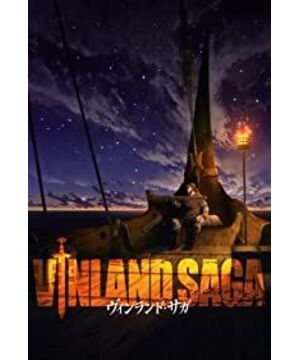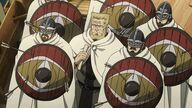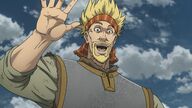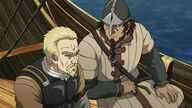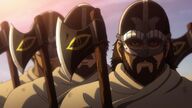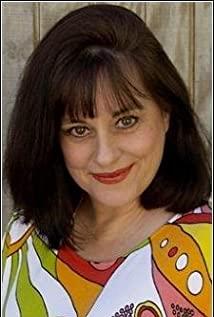The Battle of the Ice Sea is the bead of the July 19 episode. I have seen many UP masters recommend this work on station B before. The heavy historical and cultural background, lively fighting scenes, and the outstanding growth of the protagonist have added the title of a masterpiece to this work.
The author and my girlfriend have always had a preference for works with unique and outstanding themes. We have tried to make up for it many times before, but we have never been able to insist on watching the first episode. Resting at home today, I have nothing to do to find this work. I watched the fourth episode of Tuo's father's death in one breath. I didn't realize the magnificent epic feeling in my imagination. I just felt absurd and puzzled.
First of all, I declare that the author has not read the entire work of Vinland Saga, nor has I conducted too much research on the background of the work. Therefore, I am undoubtedly not qualified to make a macro evaluation of the entire work. I just want to express my work here. A regular viewer's thoughts on watching the opening episodes until Tofa's death (mostly episode 4), while taking solace in another Wednesday night for paddling. If your opinion is against mine, you are right. Sorry for any offense.
fight scene
This work starts with a fight, so let's talk about the feelings that the work gives me. Except for the short-term confrontation between Tuofu and the enemy who killed his father in the fourth episode, which has certain game and realistic elements, the rest of the scenes are basically Tuofu playing Wushuang, which makes the author a little confused: whether this work follows the realistic epic route, or is there a certain Fantasy ingredients in it? The current world record in the standing long jump seems to be 3.73 meters, which is probably the level of Tuofu's light jump; the Viking warriors are all rookies without any actual combat experience. Lightly out of range in the punch does not deal any damage. No matter how many arrows are in his body, his father can use the same tone of speech to explain the funeral and hug his son. It seems that no matter whether the chest or abdomen is injured by arrows, it will not affect breathing and cause muscle spasms.
Of course, the works will all have elements of artistic processing. The first four episodes of the play of the father did not make the author too playful.
character battle relationship
Then let the author feel strange is the relationship between the characters' combat power. First of all, since the captain of Youm paid Asherat to kill Tofu, it proved that he understood and recognized Asherat's strength, at least he would not think that he and his team could not fight Tofu at all. So, what's the point of the big tall man throwing the javelin into the tent and successfully deterring the captain? If you think it is to put pressure on the captain's limit, it seems to make sense, but this is based on a premise: the combat power of a big and tall man should not be underestimated, otherwise, letting him show his hands will only show his cowardice. The attitude of the tall man towards Asherat seems to imply that their strength is at least close. Therefore, the author is also looking forward to his performance in the battle with Tuofu. However, when the battle started, the big and tall man under the berserk medicine didn't catch his father's serious punch, and he just took on a disgraceful task of tying a child, which made the author feel that the previous role was a foil for this role. It's very strange, and then I doubt whether my judgment on the combat power of the characters in this drama will be accurate.
death of father
The death of Tofu can be said to be a relatively large climax of the first four episodes. As a legendary warrior, the ceiling of combat power left the stage early to make room for the protagonist. However, this process also left me full of doubts. In the author's perception, the death of the character is divided into two types. The occurrence of a kind of death is fleeting, it does not give you any reaction space but it is very natural, making you think that this is the cruelty of the world and the unpredictability of fate, representative works include Giants, Game of Thrones, etc. The work impresses me so deeply that I can't think of anything else in a hurry). A death goes through layers of emotional foreshadowing, detonating the foreshadowing at the moment of occurrence to arouse the audience's emotions and naturally empathize with the audience (pretend to be an example). However, Tofu's death does not seem to fall into any of the above categories. First of all, the creator did not make any preparations for the death of Tuo's father. He did not leave home without saying too many goodbyes to his beloved wife and daughter who let him be willing to stay away from the killing, and did not give any inner portrayal to express Tuo's father's desire to die. when was it produced. However, his death was not straightforward. After several arrows in his body, he still had time to calmly explain his funeral, and to hug his favorite son again. At this moment, my emotions have not been fully mobilized, nor have I experienced the impermanence of fate, but only the intention of the creator.
On this point, I will add: After I opened the barrage, I found that many netizens were explaining that some friends said that the father decided not to kill before he set off, understanding that this was a journey to death, and some friends said that the father was discovering the ship. After entering the narrow bay, he realized that the time limit had come, and some of them said what A Xie said, and asked his father to sacrifice himself to save the rest. I think it is the creator's dereliction of duty for a work to ask readers who love it to explain it in this way, and to round out a reasonable character's mental journey for it.
My father's journey
In the end, the most difficult thing for me to empathize with the characters is that I really can't figure out the mental journey of my father. At the end of the fourth episode, even though A Xie had broken his promise and lost the duel, he still took the hostage as a threat to take his life, but he was still willing to die and put the lives of the two ships on the basis of trusting A Xie. The belief that he would neither harm other people nor sell them into slavery puzzles me. He used to kill people like drinking water. Because he loved his wife and children, he was tired of killing and put down his butcher's knife, but he refused to raise the butcher's knife again in order to protect his son and the villagers. His death was a bit forced in the author's opinion. It didn't make me appreciate the perseverance of the Viking warriors. Instead, it tasted a little bit of the samurai of the country of the country.
The author always believes that a person who used to be a warrior will not lose his wildness in his heart, and he will not hesitate to pick up the butcher's knife again in the face of the safety of his family. In "The Burning Years", when the old colonel, who was lame and crooked, and tried to keep his sons away from the war for half his life, picked up the double-barreled shotgun again to protect the last son beside him, this idea was implanted in my heart. .
write at the end
The author's words about the family in the first four episodes of Binghai War is really a personal opinion, please friends Haihan.
View more about Vinland Saga reviews


